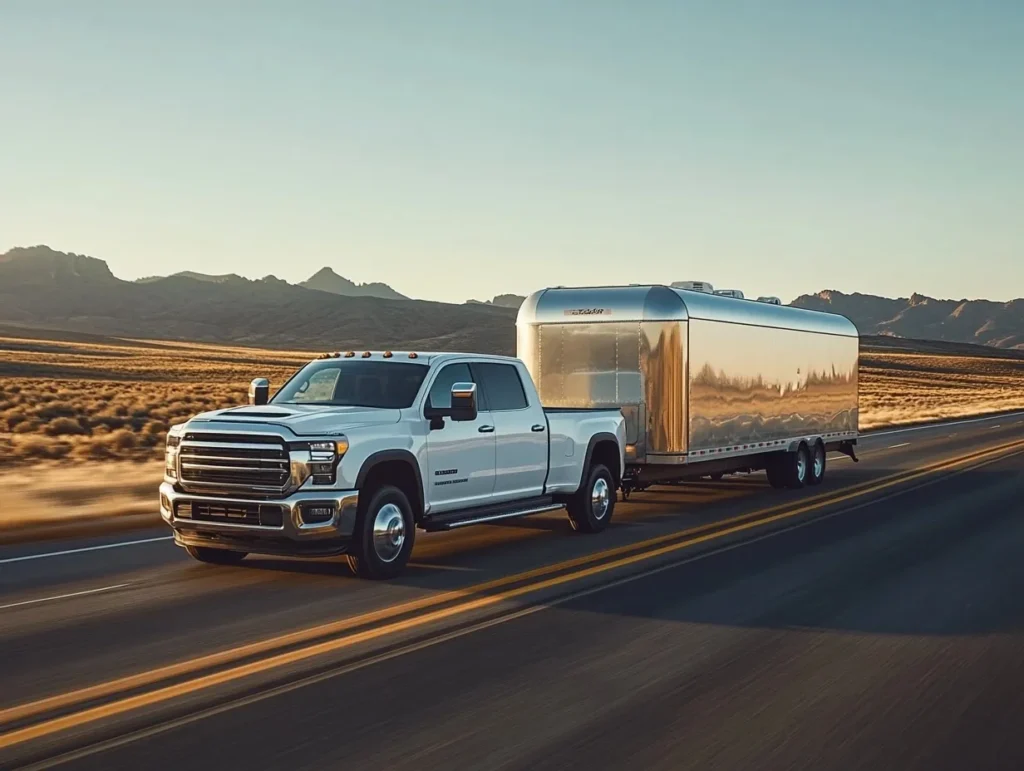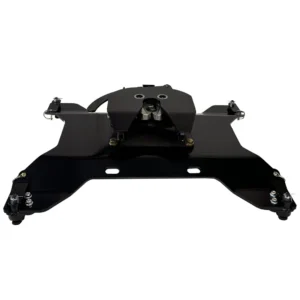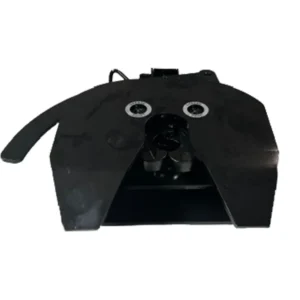
Many common towing mistakes can be prevented with an adjustable 5th-wheel hitch. According to the National Highway Traffic Safety Administration (NTSHA), approximately 50,000 trailer hitch accidents happen every year in the United States. In this article, we discuss 5 of the most common towing mistakes and how using a 5th-wheel hitch can prevent them.
Table of Contents
What is a 5th-wheel Hitch?
A 5th-wheel hitch is a type of trailer hitch that is mounted in the bed of a pickup truck and connects to a “kingpin” on the front of a fifth-wheel trailer. The hitch acts like a horseshoe-shaped coupling mechanism that allows the trailer to pivot and turn smoothly while being towed, similar to how a semi-truck connects to its trailer.

The hitch rests on hinges, which makes it much more flexible when driving around. Fifth-wheel hitches are often used for towing large RVs, campers, and travel trailers due to its stability and weight distribution capabilities.
Benefits of a 5th-wheel Hitch
A 5th-wheel hitch has many benefits, including improved stability, weight distribution, and comfort, which add up to a generally smoother, quieter, and more stable towing. Additionally, 5th-wheel hitches come in a wider variety of weight capacity and slider options.
Stability
The kingpin and plate design of a 5th-wheel hitch keep the trailer stable.
Shock Absorption
The hitch can absorb shocks from bumps and potholes so the ride is smoother.
Weight Distribution
The hitch distributes weight over the rear tire axles, making a smoother towing experience. Also, the hitch reduces stress on the towing vehicle’s suspension and frame.
Popular 5th-Wheel Hitch Options
-
EZ Elite OEM Kit
Price range: $1,450.00 through $1,750.00 -
EZ Elite 5th Wheel Kit
$1,450.00 -
34K Haulin’ Head Unit
$895.00
Common Towing Mistakes
Let’s look at 5 of the most common towing mistakes and how a 5th-wheel hitch can prevent them.
1. Weight Distribution
One of the most important factors in towing is weight distribution. For safety and efficiency, it’s important to understand how weight is spread across your tow setup. Uneven weight distribution can lead to dangerous situations, affecting the towing vehicle’s handling, braking, and overall stability on the road. Properly balancing the weight ensures that the tow vehicle’s tires maintain solid contact with the road, preventing swaying, fishtailing, and jackknifing.
One of the most critical components of weight distribution is tongue weight. Tongue weight is the downward force exerted on the hitch by the trailer or towed vehicle.
If you have too much weight distribution, it is called Over Distribution. Over distribution can cause brake and axle fatigue and failure. If you have too much weight exerted on the hitch ball, the force could overload the rear tires of the tow vehicle and push the rear end of the vehicle around. Conversely, if you don’t have enough weight on the tongue, it is called Under Distribution. Under distribution can cause loss of steering and braking control, and increase the potential for the trailer to sway.
5th-Wheel Hitch Solution
A properly installed 5th-wheel hitch helps distribute the trailer’s weight more evenly across the truck, therefore, reducing strain on the tow vehicle and improving handling. A standard 5th-wheel hitch can help with under distribution by placing the trailer’s weight forward on the truck by putting more weight on the front axle and alleviating excessive weight on the rear axle. A 5th-wheel hitch can’t address over distribution unless it has a sliding mechanism that allows you to adjust the hitch position slightly forward or backward, depending on your trailer’s weight distribution needs.
2. Brakes
Ensuring that the braking systems on your vehicle and the trailer are in good order should not be overlooked. Before getting on the road, check for proper functioning of your trailer brakes by inspecting the brake components. Ensure the wiring is secure, test the brake controller, and perform a test pull to confirm the brakes engage appropriately at low speeds. Look for signs like uneven braking, excessive delay in braking, or complete lack of braking. These signs may indicate issues with the brake pads, rotors, wiring, or the brake controller itself.
5th-Wheel Hitch Solution
A 5th-wheel hitch can significantly help reduce stress on your vehicle’s brakes by providing better weight distribution across the towing vehicle. This equates to less load being placed on the rear axle and, therefore, less strain on the brakes when braking. When towing heavy trailers like fifth wheel RVs, this is particularly beneficial. Where braking is concerned, a 5th-wheel hitch helps with weight distribution, improves stability, and reduces trailer jacking.
3. Wrong Size Ball or Ball Mount
Having the wrong size ball and/or ball mount is a common mistake. If you have the wrong size ball when towing, your trailer may not properly connect to your vehicle. This can potentially cause it to detach while driving, leading to a dangerous situation with a runaway trailer due to an improper fit. There are three different sized balls for standard bumper towing: 17/8 inch, 2 inch, and 25/16 inch. Each ball comes with a different weight rating. If you check the tongue or coupling on the trailer, it should have the ball size required stamped on it.
Using a ball that is too small will cause the trailer coupler to be unsecure and possibly come loose while driving. A ball that is either too large or too small can cause the trailer to pitch or sway excessively, affecting the handling and stability. An incorrect ball size can put extra strain on the hitch, trailer frame, and vehicle suspension.
5th-Wheel Hitch Solution
A 5th-wheel hitch can effectively alleviate the issue of having the wrong size ball because it uses a completely different coupling mechanism, the kingpin. This eliminates the need for a trailer ball altogether, making the size of the ball on your truck irrelevant with a 5th-wheel hitch.
4. Wrong Weight Distribution Bars
When it comes to weight distribution bars, bigger isn’t necessarily the right choice. Be sure to check your tongue weight and have the correct equipment. When you have the wrong setup, you may notice your vehicle and trailer bounding around and are more likely to experience trailer sway. With trailer sway, you may have difficulty steering and it could damage the trailer frame and hitch.
5th-Wheel Hitch Solution
A 5th-wheel hitch naturally distributes weight more evenly compared to a conventional trailer hitch, so that a weight distribution hitch is not necessary. 5th-wheel hitches are designed to connect higher up on the truck to provide stability and weight distribution, therefore, making the need for additional weight distribution bars unnecessary.
5. Tire Pressure
If your tires are under inflated, you can experience trailer sway. Be sure to check the pressure for all tires on your vehicle and trailer before hitting the road. Ensure they are evenly inflated at the correct pressure. This allows them to wear evenly and help you avoid a blowout on the road. The Tire and Loading Information sticker on your vehicle specifies the PSI values for front and rear tires. Typically, it is one PSI for front and other PSI for rear. Since many trailers sit during the off-season, the tires may lose pressure during that time of inactivity. When they sit and aren’t being used consistently, the tires can lose air and degrade faster, so check for wear and tear as well.
5th-Wheel Hitch Solution
A 5th-wheel hitch can significantly help reduce trailer sway by connecting the trailer directly above the rear axle of the towing vehicle and providing a more stable connection and minimizing the potential for swaying. The hitch is located directly over the truck’s rear axle, which helps to counteract the forces that cause the sway. However, a 5th-wheel hitch cannot compensate for low tire pressure.
Stay Safe on the Road with a Better Hitch
Towing doesn’t have to be stressful. The right setup can prevent common mistakes like poor weight distribution, trailer sway, and excessive strain on your vehicle. An adjustable 5th wheel hitch gives you more control, better stability, and a safer ride, so you can tow with confidence.
Check out our 5th wheel hitches or reach out to find the best fit for your truck and trailer.
Contact Us
Let's make something special! Provide us with the vehicle information and a short description for what you're looking for. We'll contact you with some ideas to get started.
"*" indicates required fields




